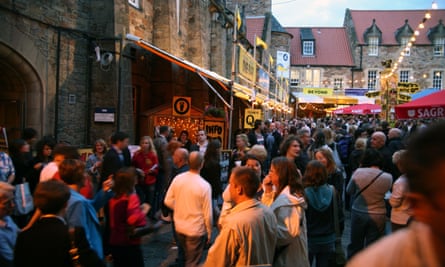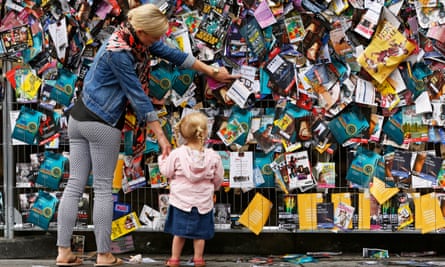
‘It’s an investment’
“The big, difficult cost this year is accommodation,” says RoguePlay’s artistic director Kim Wildborne. The physical theatre company is heading to Edinburgh with Forests, a show about the destruction of the rainforest, featuring three acrobatic performers and a prop willow tree.
There’s also a lighting and sound technician (made into one job to cut costs), plus a combined admin and childcare role, as the company is travelling with children. Cheaper university halls wouldn’t suit their needs. “When we first started looking at accommodation, we were looking at £15,000-18,000,” says Wildborne. “This isn’t fringe-specific, but when you’re a mother in the arts, you are excluded from a lot of opportunities.” They eventually found something “in line with other years, but still about £1,000 a week”.
Other costs include venue fees – RoguePlay received “a good deal” from C Venues after performing there in previous years – plus transport, wages, marketing and a budget for set and costume repairs.
RoguePlay, a 14-year-old company, has the cashflow for this upfront investment. Smaller companies might not, Wildborne says, and companies with access needs face additional costs. RoguePlay is among 50 winners of the new Keep It Fringe fund led by Fringe Society president Phoebe Waller-Bridge – £2,000 cash, plus train fare and TikTok marketing spend.
Will they make money? “If you break even that’s a bonus,” Wildborne says. “It’s not just about bums on seats, the more important thing is using the fringe to generate relationships with people interested in the work. We should end up with tour dates for 2024. That’s why you go. It’s an investment.”
Costs: £12,000
(Includes £4,000 on accommodation and £1,000 on marketing, posters and flyers)
 View image in fullscreenCrowded marketplace … Edinburgh’s Pleasance Courtyard. Photograph: Jeffrey Blackler/Alamy
View image in fullscreenCrowded marketplace … Edinburgh’s Pleasance Courtyard. Photograph: Jeffrey Blackler/Alamy
‘I’m spending the cost of a wedding!’
When standup Tamsyn Kelly first did the fringe in 2019, “it was absolute hell”. She used her savings then worked remotely, managing a charity comms team while she was there, which meant she missed out on taking extra fringe gigs and networking. Last year, she returned with Sian Davies’ Best in Class initiative, which brings working-class comedians to the festival, and it was “a dream”.
This year, Kelly is going it alone. “My friends are getting married and I’m spending the cost of a wedding on a show. It’s embarrassing!” She’s decided to go “full out”, investing in PR, marketing, and a prominent venue. Even so, she can’t afford photography, design and other costs for an outdoor poster (which can be up to £3,000) and only has a director because fellow working-class comic Amy Gledhill offered to do it for free.
“I feel like it’s the last year I’ll do it, because it’s not financially viable,” she says. “My room’s a 50-seater. Even if I sold every ticket, I’m not making that back.” But there are other reasons to go: “People use it to raise their profile, to further their career. If you’ve got a good show, it can do that, but for the machine to work, that costs money.”
There are creative motivations, too: “Artistically, it’s nourishing. You’re showing another arsenal of skills. For working-class people, because it’s such a big deal to spend this money, I’m not going unless I’ve got a really good story to tell.”
While she’s digging into her savings again, TV production companies she’s been working with have offered help, too. “That makes me feel valued. Many came up through the fringe and think: why shouldn’t she get to go?”
Ultimately, the pay to play model makes the fringe “a gamble”, Kelly says, but with industry encouragement, she feels optimistic. “I’ve had space and time to develop work with support I’d never had before. That makes a difference. People are acknowledging that working-class comics deserve to be here.”
Costs: £7,746
(Includes £1,200 on accommodation, £1,300 on tech and £3,910 on PR, posters and flyering)
 View image in fullscreenPosters and flyering are factored into a show’s budget. Photograph: Murdo Macleod/the Guardian
View image in fullscreenPosters and flyering are factored into a show’s budget. Photograph: Murdo Macleod/the Guardian
‘Not sustainable, not healthy’
Female-focused theatre company The Thelmas – Madelaine Moore and Guleraana Mir – made their fringe debut with 2018’s Ladykiller. They’re returning with Santi & Naz, a play by Mir and afshan d’souza-lodhi, about two girls, one Muslim, one Sikh, in the years preceding the partition of India.
Their first fringe was “a huge financial risk. Most of it went on my credit card and we did crowdfunding,” says Moore. The show sold well and raised their profile, but was exhausting. “No one really got paid. But it led to paid work later. It’s a very expensive way of proving your work.”
That success was partly down to time-consuming grassroots audience development, says Mir. With Santi & Naz previews, they’ve been connecting with Indian-restaurant staff: “It’s important to us that when we make work about communities, they’re first in the door. That’s a lot of work and there’s never money for outreach.”
But this year, securing the Pleasance Charlie Hartill fund allowed them to create their ideal budget, which Pleasance covers upfront then redeems from sales. “We talked through what we wanted money to go towards, making sure everybody is paid a fair fee,” Mir says. At a break-even point of 40% tickets sold, they’ll start making money, based on a box-office split. Funding from the Keep It Fringe Fund (£2,000) and Arts Council England (nearly £30,000 to develop the play, but not for Edinburgh itself) helped, too.
Would they be going without this? “Our reserves got wiped out during the pandemic. Financially we’re starting from zero,” says Moore. “So, no, we absolutely wouldn’t.”
Rising costs mean artists feel pressure to make commercial hits, removing the festival from its experimental origins, says Moore: “It’s not sustainable. It’s not healthy. It doesn’t make good art.” The pair advise honest reflection. “You have to know why you’re going. Is it the right show?” Mir says. Moore agrees: “Have a good strategy, because otherwise, what are you doing? It’s a lot of money.”
Costs: £22,000
(Includes £5,800 on accommodation, £8,200 on cast and creative fees, £4,000 on PR and marketing and £1,600 on access costs)
-
Forests is at C Aurora, Edinburgh, 2–24 August. Crying in TK Maxx is at Pleasance Courtyard, 2-27 August. Santi & Naz is at Pleasance Courtyard, 2–28 August.



